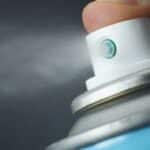Products from aerosol spray cans can be inhaled or ingested as a form of recreational substance abuse. Abusing aerosol products can cause a euphoric “high,” along with side effects such as slurred speech, dizziness, seizures, and death.
Many aerosol products can be bought without restrictions. Products such as hairspray, spray paint, deodorant, cleaning fluids, vegetable oil sprays, whipped cream canisters, adhesives, and air fresheners contain aerosols and solvents, which can be inhaled through a variety of methods.
Inhaling or ingesting aerosol products can be hazardous to your health.
What Is Aerosol Spray Abuse?
The compressed gases contained inside aerosol cans can be appealing targets of abuse.
Specific ingredients that may be inhaled from aerosol products include:
- hydrofluorocarbons
- hydrocarbons
- butane
- nitrous oxide
- nitrites
Aerosol spray abuse may be performed by spraying aerosols directly into the nose or mouth. Compressed air can be stored in aerosol products due to the high pressure, which can function as a propellant and allow these products to reach the nose or mouth easily.
Aerosol products may also be sprayed into a plastic and paper bag, where they are inhaled. This process is known as “bagging.”
Effects Of Aerosol Spray Abuse
When inhaled or ingested, aerosol products may affect the central nervous system in a manner similar to benzodiazepines or alcohol. Slowed activity in the CNS can produce effects of euphoria, impairment, and a loss of coordination.
The effects of aerosol on the brain may only last a short time, which may encourage patterns of rapid, repeated use.
Effects of aerosol spray abuse may include:
- euphoria
- loss of coordination
- impairment
- dizziness
- lightheadedness
- delirium
- damage to the nasal passages and oral cavity
These effects may become more severe in higher concentrations.
Dangers Of Aerosol Spray Abuse
The organic compounds and hazardous chemicals in aerosol products are not approved for direct ingestion. Inhaling these products can cause serious side effects in both the short-term and long-term.
Empty aerosol cans are classified as hazardous waste by the U.S. Environmental Protection Agency, and many labels for these products have warnings against their ingestion.
The harmful carbon footprint aerosol products can leave on the environment may be much more acute in an individual.
Long-Term Health Effects
Long-term abuse of aerosols can cause long-term health effects such as brain and nerve damage, reduced executive functioning, liver and kidney damage, and damage to the nasal passages and oral cavity.
Repeatedly inhaling the fine mist emitted by aerosol cans can wear down on the body, and the chemicals contained within can damage the brain and other vital organs.
Overdose & Death
Overdosing on aerosol products can be caused by repeated short-term use, or simply inhaling high concentrations at once. An aerosol overdose can cause seizures, coma, heart failure, and death.
The risk of heart failure after abusing inhalants is also known as sudden sniffing death. Unsafe use of inhalants can also cause death through suffocation.
Chronic Aerosol Use
Studies have suggested that aerosol spray abuse can be habit-forming. Individuals with a history of inhalant abuse have reported a strong need to continue taking these products.
Chronic use patterns and mild withdrawal symptoms have also been reported.
Additionally, people with a history of inhalant abuse have a higher prevalence of prescription drug and illicit drug abuse. Behaviors that were developed during episodes of aerosol use may carry over to prescription drugs, though more research may be needed to establish this link.
Treatment For Aerosol Abuse
Aerosol products no longer contain chlorofluorocarbons (CFCs), a chemical that can destroy the Earth’s ozone layer. However, the risk of handling aerosols extends to people as well, and the scope of aerosol product abuse is widespread.
Professional treatment programs may help victims address and remedy the habit-forming nature of aerosols. Methods such as behavioral therapy can help patients find alternatives to aerosol abuse and prepare them for long-term sobriety.
Other treatment options include group therapy, peer support, and mental health counseling. For information on our outpatient treatment programs, please contact us today.
Sources
Written by
Northeast Addition Editorial Team
©2024 Northeast Addition Center | All Rights Reserved
This page does not provide medical advice.



